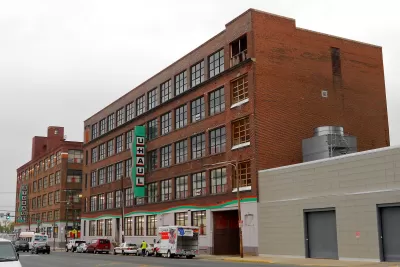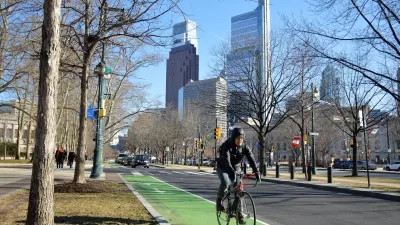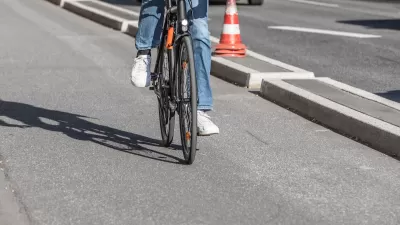The city pulled the plug on a proposed street redesign after community groups criticized the public engagement process for not listening to all local voices.

A plan to redesign a dangerous five-lane Philadelphia street by reducing it to three traffic lanes and adding parking-protected bike lanes has stalled after local opponents voiced concerns that the public engagement process didn't reach enough residents and stakeholders. As Jared Brey reports, the city's Office of Transportation, Infrastructure, and Sustainability (OTIS) developed the plan for Washington Avenue with a focus on Complete Streets principles, but ultimately decided to change the design.
"With U.S. pedestrian deaths spiking and the federal government calling for a national roadway safety initiative, Philly's surprise U-turn on Washington Avenue shows how efforts to redesign streets for multiple user groups can get complicated, particularly in gentrifying areas," Brey writes. "Road diets can be very visible signs of neighborhood change, and they’re driven by city government, so communities often associate them with a range of issues that go beyond traffic safety. Bike lanes in particular are often seen as symbols of gentrification."
Although more than 70 percent of respondents in a city survey supported the three-lane plan, some residents say they were never given information about the project or the opportunity to respond to the survey. According to Mike Carroll, deputy managing director for OTIS, the fact that the concerns came from Black, low-income communities made the office take pause and "recalled painful historical instances of destructive transportation planning done by technocrats without input from communities of color."
OTIS is going back to the drawing board and "moving forward with plans to redesign the street, using elements of the three-lane and four-lane mixed approach. The office says it will announce the construction plans at a public meeting on March 1."
The source article provides more details on the three alternatives for the Washington Avenue redesign, all of which include protected bike lanes.
FULL STORY: How a Philadelphia Road Redesign Went Off the Rails

Maui's Vacation Rental Debate Turns Ugly
Verbal attacks, misinformation campaigns and fistfights plague a high-stakes debate to convert thousands of vacation rentals into long-term housing.

Planetizen Federal Action Tracker
A weekly monitor of how Trump’s orders and actions are impacting planners and planning in America.

San Francisco Suspends Traffic Calming Amidst Record Deaths
Citing “a challenging fiscal landscape,” the city will cease the program on the heels of 42 traffic deaths, including 24 pedestrians.

Defunct Pittsburgh Power Plant to Become Residential Tower
A decommissioned steam heat plant will be redeveloped into almost 100 affordable housing units.

Trump Prompts Restructuring of Transportation Research Board in “Unprecedented Overreach”
The TRB has eliminated more than half of its committees including those focused on climate, equity, and cities.

Amtrak Rolls Out New Orleans to Alabama “Mardi Gras” Train
The new service will operate morning and evening departures between Mobile and New Orleans.
Urban Design for Planners 1: Software Tools
This six-course series explores essential urban design concepts using open source software and equips planners with the tools they need to participate fully in the urban design process.
Planning for Universal Design
Learn the tools for implementing Universal Design in planning regulations.
Heyer Gruel & Associates PA
JM Goldson LLC
Custer County Colorado
City of Camden Redevelopment Agency
City of Astoria
Transportation Research & Education Center (TREC) at Portland State University
Jefferson Parish Government
Camden Redevelopment Agency
City of Claremont





























